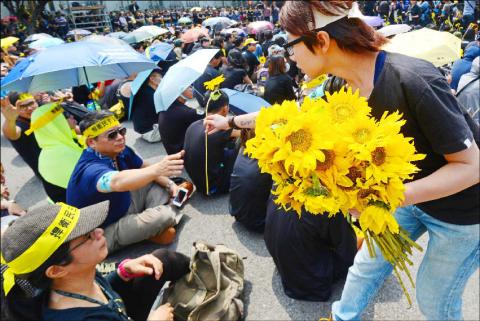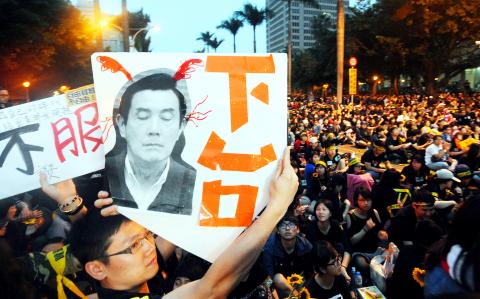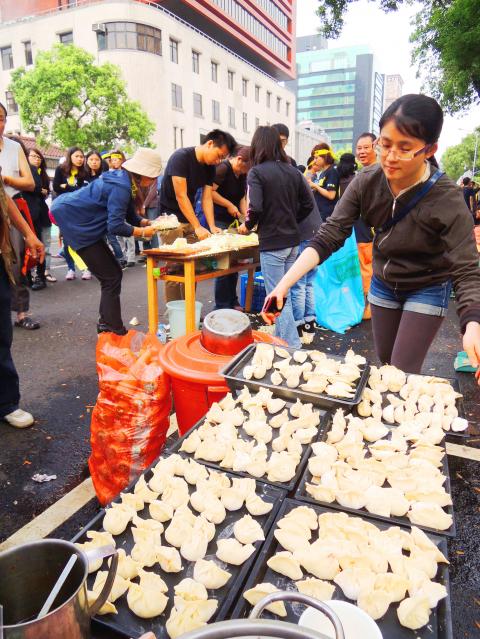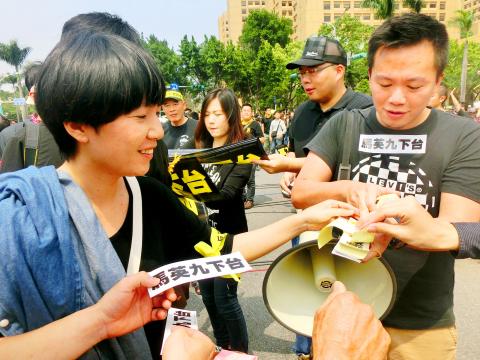From all walks of life, supporters of the “Sunflower student movement” took to the street in Taipei yesterday, marked by festivity, diversity and order.
An hour before the scheduled start of the event at 1pm, the “black-clad army” — dress code for the protest against the government’s handling of the controversial cross-strait service trade pact — emerged from nearby MRT stations and packed the designated protest site in front of the Presidential Office Building on Ketagalan Boulevard.
“I am here to support these students. I’m here out of guilt because people of my generation have done too little. We owe these kids a better Taiwan,” said Chiu Shih-lung (邱仕龍), who is in his 70s.

Photo: Sam Yeh, AFP
Chiu, who came from Greater Kaohsiung, said he supported the students’ cause of safeguarding Taiwan’s democracy and demanding the withdrawal of the cross-strait service pact because “it endangers national security and sovereignty.”
“We must safeguard our island’s interests,” said Chin Mei Ching, a 29-year-old mother who was pushing her one-year-old daughter in a buggy. “We have to guard against China using the economy to control us.”
The majority of the protesters were students and young people.

Photo: Lo Pei-der, Taipei Times
They brought sunflowers, a symbol of the protests, and wore yellow ribbons that read “Fight for democracy, retract the service trade pact.”
Some posed with self-made banners, on which were slogans such as “Condemn state violence” and “I don’t want the service trade pact,” or demanding President Ma Ying-jeou (馬英九) and Premier Jiang Yi-huah (江宜樺) step down.
Alliance of Civil Action Against Ma Ying-jeou spokesperson Shen Chih-lin (沈志霖) stood in the crowd and gave out stickers that read: “Ma Ying-jeou step down” (馬英九下台).

Photo: Chang Wen-chuan, Taipei Times
Shen said he prepared 1,500 of the stickers and distributed them near the Jingfumen (景福門), which directly faces the Presidential Office Building, and 500 of them were taken by eager protesters in the space of one minute.
A man disappointed with Ma’s failed governance suggested Shen print a sticker that read: “Nine percent approval rating, Ma Ying-jeou step down,” adding: “How can Ma govern the nation or gain trust from the people with such a low approval rating?”
Separately, students from Taipei National University of the Arts brought 3,000 sunflower brooches they had made and gave them out to the protesters.

Photo: Lee Hsin-fang, Taipei Times
The students said that about 10 students worked on the brooches from 6pm on Saturday until early yesterday, with NT$30,000 of funds they had raised.
Half of the brooches were given out within 10 minutes, near NTU Hospital MRT Station’s exit No. 1, at 1pm. The students said they kept the rest for distribution at the legislature.
Like their peers at the week-long sit-ins around the legislature compound, besieged by students and other activists and protesters since March 18, university professors made the street their classrooms, holding discussions and having students express their views about the trade deal with China.
A student spoke through a loudspeaker to his classmates from Soochow University, saying that he believed young people “would see a different face of society when they are on the street” and that would be at least as meaningful — if not more meaningful — as studying in the library or doing laboratory research.
Designer Chiang Lin Chia-jen (姜林家真) held a handmade, helmet-shaped umbrella that read: “Don’t hit my head” to protest against the violence the government used against unarmed student protesters at the Executive Yuan on Monday morning.
In front of the Legislative Yuan, a university junior student surnamed Hu (胡) set up a tent with a sunflower painted on it, inviting protesters to help use their fingerprints to color the sunflowers — to symbolize that the student movement is a result of the gathered strength of the people.
Many people lent their fingerprints, and the painting was almost finished by noon.
Hu said she had taken pictures of everyone who left a handprint on it, and that she will upload the photographs and the final painting on a Facebook page, in memory of “the year we stood up for the student movement.”
Yesterday’s protest was aimed at more than just the trade agreement, which was unilaterally passed through its committee without deliberation by Chinese Nationalist Party (KMT) lawmakers on March 17 and sparked the student-led movement, as non-governmental organizations (NGOs), which worked with the students to organize the protest, also took the opportunity to promote their causes.
A total of 22 NGOs, which focused on a wide range of social issues, such as gender, education, culture and environment, set up booths on Zhongshan S Road.
The student movement has received strong support for a reason, Northern Coast Anti-Nuclear Action Alliance chief executive Kuo Ching-lin (郭慶霖) said.
“People support the movement because they understand that Taiwan has a long way to go as a democracy. For years, the government had always made unilateral decisions without consulting the people, such as the construction of nuclear power plants and nuclear waste storage sites,” Kuo said.
“Most people no longer trust the government,” he added.
Politicians have taken a back seat in the protests, with Democratic Progressive Party (DPP) heavyweights choosing to participate in the protest quietly, without drawing too much attention.
Wearing a black shirt, DPP Chairman Su Tseng-chang (蘇貞昌) said he attended the event as a citizen, while former DPP chairperson Tsai Ing-wen (蔡英文) praised the students’ courage and discipline and urged Ma to ease people’s suspicions by making substantial promises.
The DPP Central Committee had instructed its members who plan to take part in year-end elections not to attend the demonstration wearing their campaign vests.
In addition, election flags and campaign vehicles were prohibited at the protest sites.
Additional reporting by Huang Hsin-po and agencies

INVESTIGATION: The case is the latest instance of a DPP figure being implicated in an espionage network accused of allegedly leaking information to Chinese intelligence Democratic Progressive Party (DPP) member Ho Jen-chieh (何仁傑) was detained and held incommunicado yesterday on suspicion of spying for China during his tenure as assistant to then-minister of foreign affairs Joseph Wu (吳釗燮). The Taipei District Prosecutors’ Office said Ho was implicated during its investigation into alleged spying activities by former Presidential Office consultant Wu Shang-yu (吳尚雨). Prosecutors said there is reason to believe Ho breached the National Security Act (國家安全法) by leaking classified Ministry of Foreign Affairs information to Chinese intelligence. Following interrogation, prosecutors petitioned the Taipei District Court to detain Ho, citing concerns over potential collusion or tampering of evidence. The

TRADE: The premier pledged safeguards on ‘Made in Taiwan’ labeling, anti-dumping measures and stricter export controls to strengthen its position in trade talks Products labeled “made in Taiwan” must be genuinely made in Taiwan, Premier Cho Jung-tai (卓榮泰) said yesterday, vowing to enforce strict safeguards against “origin laundering” and initiate anti-dumping investigations to prevent China dumping its products in Taiwan. Cho made the remarks in a discussion session with representatives from industries in Kaohsiung. In response to the US government’s recent announcement of “reciprocal” tariffs on its trading partners, President William Lai (賴清德) and Cho last week began a series of consultations with industry leaders nationwide to gather feedback and address concerns. Taiwanese and US officials held a videoconference on Friday evening to discuss the

NEGOTIATIONS: The US response to the countermeasures and plans Taiwan presented has been positive, including boosting procurement and investment, the president said Taiwan is included in the first group for trade negotiations with the US, President William Lai (賴清德) said yesterday, as he seeks to shield Taiwanese exporters from a 32 percent tariff. In Washington, US Trade Representative Jamieson Greer said in an interview on Fox News on Thursday that he would speak to his Taiwanese and Israeli counterparts yesterday about tariffs after holding a long discussion with the Vietnamese earlier. US President Donald Trump on Wednesday postponed punishing levies on multiple trade partners, including Taiwan, for three months after trillions of US dollars were wiped off global markets. He has maintained a 10 percent

PERSONAL DATA: The implicated KMT members allegedly compiled their petitions by copying names from party lists without the consent of the people concerned Judicial authorities searched six locations yesterday and questioned six people, including one elderly Chinese Nationalist Party (KMT) member and five KMT Youth League associates, about alleged signature forgery and fraud relating to their recall efforts against two Democratic Progressive Party (DPP) legislators. After launching a probe into alleged signature forgery and related fraud in the KMT’s recall effort, prosecutors received a number of complaints, including about one petition that had 1,748 signatures of voters whose family members said they had already passed away, and also voters who said they did not approve the use of their name, Taipei Deputy Chief Prosecutor